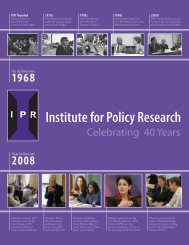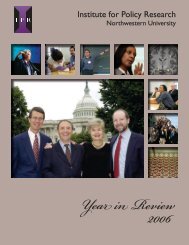Whatever Happened to the Emerging Democratic Majority?
Whatever Happened to the Emerging Democratic Majority?
Whatever Happened to the Emerging Democratic Majority?
You also want an ePaper? Increase the reach of your titles
YUMPU automatically turns print PDFs into web optimized ePapers that Google loves.
17<br />
June 6 C2S Introduc<strong>to</strong>ry Conference<br />
underpinnings as well as strengths and limitations. It is hoped<br />
that participants will come <strong>to</strong> gain a more sophisticated<br />
understanding of how biological perspectives can inform social<br />
science research.<br />
“Many researchers are conducting large-scale national health<br />
surveys and are very interested in incorporating biomarker<br />
measures,” McDade said. “We believe that sufficient training in<br />
<strong>the</strong>ory and method is critical if this is <strong>to</strong> happen successfully,<br />
and our center could become a key resource for this.”<br />
Faculty appeal<br />
Getting a research center off and running in a little over a year<br />
has been heady, exciting, and a lot of work, Chase-Lansdale<br />
noted. But much remains <strong>to</strong> be done—in particular, recruiting<br />
like-minded faculty <strong>to</strong> <strong>the</strong> effort. “We have an excellent team<br />
of core faculty members and collabora<strong>to</strong>rs,” she said, “but we<br />
are looking for o<strong>the</strong>r Northwestern faculty <strong>to</strong> join our center,<br />
who are willing <strong>to</strong> incorporate an interdisciplinary approach<br />
<strong>to</strong> solving issues of social disparities and health.”<br />
Social Disparities, Stress, and Health<br />
Culture, Social Status, and Physiology: An Integrative Approach <strong>to</strong><br />
Health Disparities Research<br />
Thomas McDade, Assistant Professor, Anthropology; IPR<br />
Faculty Fellow<br />
Neighborhood Poverty and Adolescent Health and Development:<br />
A Randomized Social Experiment<br />
Greg J. Duncan, Edwina S. Tarry Professor, Human<br />
Development and Social Policy, School of Education and Social<br />
Cells <strong>to</strong> Society<br />
(continued from page 16)<br />
family functioning, discrimination, and<br />
racism. But added <strong>to</strong> <strong>the</strong> mix will be, for<br />
example, issues such as whe<strong>the</strong>r families<br />
should pursue expensive, experimental<br />
treatments. This, in turn, brings up who<br />
should have access <strong>to</strong> <strong>the</strong>se cutting-edge<br />
medical discoveries.<br />
In Developmental Perspectives on<br />
Health Disparities from Conception<br />
Through Adulthood, research will focus<br />
in particular on prenatal and perinatal<br />
environments and how <strong>the</strong>y interact<br />
with social, genetic, and o<strong>the</strong>r biological<br />
infl uences. Social and biological risks <strong>to</strong><br />
health across <strong>the</strong> life span will also be<br />
addressed.<br />
Policy, Practice, Race, Culture, and<br />
Ethics will traverse all of <strong>the</strong> center’s<br />
research initiatives. Health disparities<br />
based on racism and cultural exclusion<br />
carry profound ethical and political<br />
Policy; IPR Faculty Fellow<br />
implications. Certain cultural dynamics,<br />
for example, can generate resistance<br />
<strong>to</strong> biological measures and standard<br />
research procedures. Research in this<br />
area will also aim <strong>to</strong> promote responsible<br />
uses of race and ethnicity in biomedical,<br />
biotechnology, and pharmaceutical<br />
research.<br />
First activities<br />
Despite being only a few months<br />
old, <strong>the</strong> center has already launched<br />
an introduc<strong>to</strong>ry conference and cosponsored<br />
a biomarker workshop.<br />
The June 6 introduc<strong>to</strong>ry conference<br />
brought <strong>to</strong>ge<strong>the</strong>r more than 65<br />
Northwestern faculty and research staff<br />
from across <strong>the</strong> university, representing<br />
schools such as medicine and education<br />
and social policy and departments such<br />
as neurobiology, psychology, economics,<br />
and microbiology. The presentations<br />
were equally broad based covering<br />
aspects of biomarkers, risk fac<strong>to</strong>rs<br />
for heart disease, protein misfolding,<br />
Stress in Biology and Medicine: From Molecules <strong>to</strong> Protein Misfolding<br />
and Dementia<br />
Richard I. Morimo<strong>to</strong>, Bill A. and Gayle Cook Professor, Departments<br />
of Biochemistry and Molecular and Cell Biology<br />
Developmental Perspectives on Health Disparities<br />
from Conception Through Adulthood<br />
Prenatal Infl uences on Adult Health Disparities<br />
Chris<strong>to</strong>pher Kuzawa, Assistant Professor, Anthropology;<br />
IPR Faculty Fellow<br />
Pre-Term Birth: Evidence of Gene-Environment Interactions<br />
Xiaobin Wang, Direc<strong>to</strong>r and Mary Ann and J. Milburn Smith<br />
Research Professor; Children’s Memorial Research Center<br />
Risk Fac<strong>to</strong>rs for Heart Disease<br />
Philip Greenland, Harry W. Dingman Professor; Executive<br />
Associate Dean for Clinical & Translational Research, Feinberg<br />
Families, Relationships, and Health<br />
Social Relationships and <strong>the</strong> Regulation of Stress Hormones<br />
Emma K. Adam, Assistant Professor, Human Development<br />
and Social Policy, School of Education and Social Policy; IPR<br />
Faculty Fellow<br />
The Stress of Caregiving for Ill Family Members: Impact on<br />
Health Outcomes<br />
neighborhood effects, and bioethics,<br />
among o<strong>the</strong>rs.<br />
A few days later on June 9-10, a<br />
biomarker workshop on populationbased<br />
research was co-sponsored by<br />
C2S and <strong>the</strong> University of Chicago.<br />
The agenda featured C2S members,<br />
who discussed conceptual models and<br />
analytic methods for linking social and<br />
biological processes.<br />
Future directions<br />
C2S will swing in<strong>to</strong> action this fall<br />
with several activities. It will launch its<br />
colloquium series, which will take place<br />
on Mondays.<br />
The center has initiated <strong>the</strong> search for<br />
two senior faculty members, who will be<br />
jointly appointed between IPR/C2S and<br />
departments in <strong>the</strong> Weinberg College of<br />
Arts and Sciences.<br />
Planning has begun for <strong>the</strong> 2006<br />
C2S summer institute on biomarkers.<br />
The week-long institute will tackle not<br />
only <strong>the</strong> “nuts and bolts” of biomarker<br />
usage, but also detail its <strong>the</strong>oretical
















